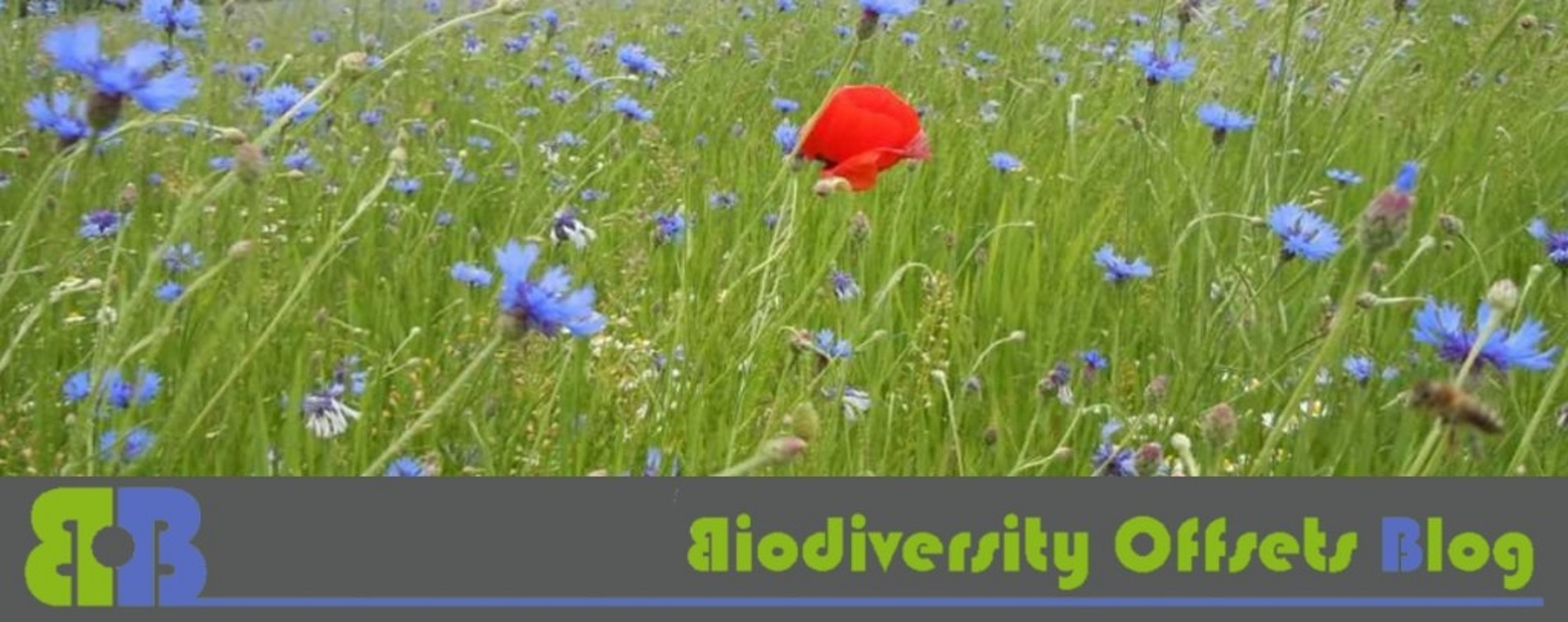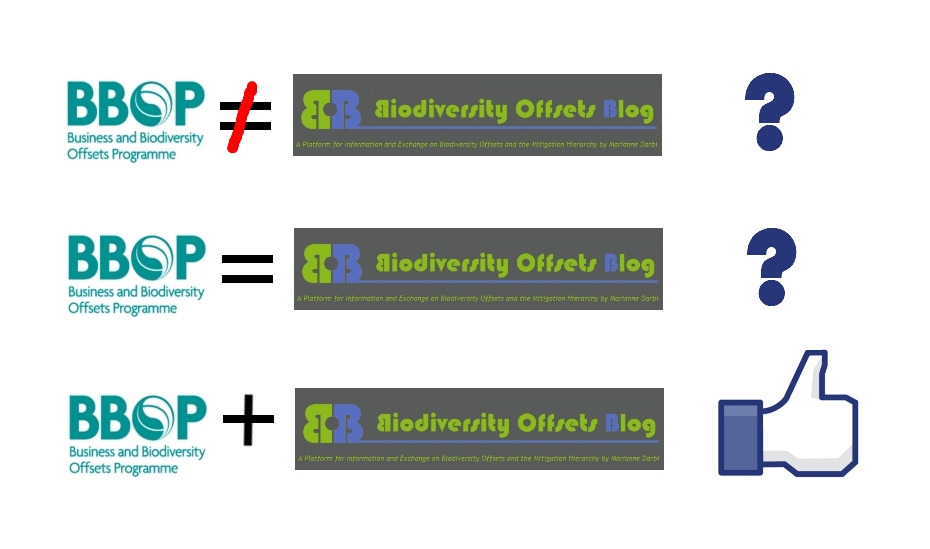 Admittedly, I did exaggerate a bit with the play on words in the title of the post and the pathos of the words unveils more sarcasm than an honest question. But as long as this blog exists I have felt the need to clarify the relation between the long standing success of the Business and Biodiversity Offset Program (which celebrates its 10th anniversary this year – happy birthday BBOP!) and the newbie, which is the Biodiversity Offsets Bog (short: BOB). This feeling was encouraged by several people’s remarks or questions in this regard: Is another platform needed or useful beside BBOP and if yes, what would be the added value of it? How does it relate to the BBOP No Net Loss Discussion Group on LinkedIn? How can such a platform be sustained in the long run? Now, these points have been loosely touched here and there on the blog and I will summarize the main points in this post. Continue reading
Admittedly, I did exaggerate a bit with the play on words in the title of the post and the pathos of the words unveils more sarcasm than an honest question. But as long as this blog exists I have felt the need to clarify the relation between the long standing success of the Business and Biodiversity Offset Program (which celebrates its 10th anniversary this year – happy birthday BBOP!) and the newbie, which is the Biodiversity Offsets Bog (short: BOB). This feeling was encouraged by several people’s remarks or questions in this regard: Is another platform needed or useful beside BBOP and if yes, what would be the added value of it? How does it relate to the BBOP No Net Loss Discussion Group on LinkedIn? How can such a platform be sustained in the long run? Now, these points have been loosely touched here and there on the blog and I will summarize the main points in this post. Continue reading
About the Biodiversity Offsets Newsweek
If you are interested in environmental compensation and biodiversity offsets, there are certainly good news: there is now a whole bunch of information from different sources,  locations and viewpoints publicly available (something which wasn’t this easy only a couple of years ago). Now, as has been pointed out (see here) the Biodiversity Offsets Blog aims to compile and somewhat structure this information. But there is not only a wealth of sources already out there on the internet, but also new sources are continuously being added. I am following and collecting the news via Scoop.it and cover the most trending ones in posts on the Biodiversity Offsets Blog. Nevertheless, not all news can be covered (at least not yet) and therefore the “Biodiversity Offsets Newsweek” will list up the headlines of the past week, together with the links and PDFs of the articles or news (the latter to prevent to loose information — as we know, that unfortunately every now and then things are being removed from the internet).
locations and viewpoints publicly available (something which wasn’t this easy only a couple of years ago). Now, as has been pointed out (see here) the Biodiversity Offsets Blog aims to compile and somewhat structure this information. But there is not only a wealth of sources already out there on the internet, but also new sources are continuously being added. I am following and collecting the news via Scoop.it and cover the most trending ones in posts on the Biodiversity Offsets Blog. Nevertheless, not all news can be covered (at least not yet) and therefore the “Biodiversity Offsets Newsweek” will list up the headlines of the past week, together with the links and PDFs of the articles or news (the latter to prevent to loose information — as we know, that unfortunately every now and then things are being removed from the internet).
This week: September 22–28, 2014
This week (September 22–28, 2014) held a multitude of different biodiversity offset news. First of all, two events on biodiversity offsets and the no net loss initiative of the EU took place in the UK and Germany. Again, several articles covered biodiversity offsets in Australia: on the one hand, Sarah Macoun and Olivia Williamson argue how the proposed amendments to the Environmental Offsets Act 2014 contribute to removing duplication associated with offset conditions imposed by Commonwealth, State and local government. On the other hand, the Conservation Council of the ACT Region states that the recently passed biodiversity offset legislation in the ACT will result in net loss of biodiversity in the Canberra region. Beside some BAU (business as usual) articles from the UK, namely the “nightingales of Lodge Hill” (where a housing development is planned) and Smithy Wood (in which a motorway service station shall be built), and some examples of biodiversity offsets and mitigation banking in the US, the most interesting point is probably the advancement of biodiversity offsets in Latin America. Argentina, Brazil, Chile, Colombia, Mexico, Peru and Venezuela are the countries with some kind of biodiversity offsetting system, while Ecuador is studying how to implement a mechanism. This Newsweek closes with some biodiversity offset related videos I have found on YouTube and some criticism on biodiversity offsets, e.g. Kumi Naidoo claims that “we cannot accept so-called ‘forest offsets’ that allow the fossil fuel industry to continue polluting”.
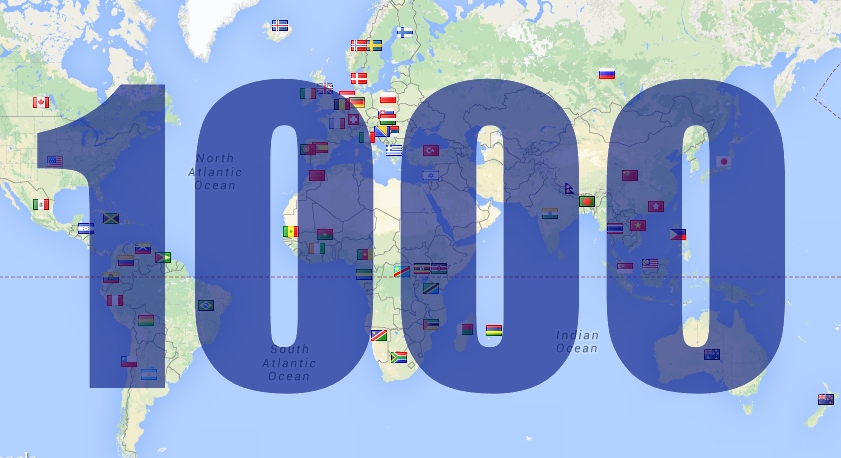
Yesterday evening around 9 pm (GMT+1) the Biodiversity Offsets Blog
welcomed its 1000th visitor! Now, that was both really exciting and unexpected for me. When I started this whole thing a couple of weeks ago it was meant to be nothing more than my very personal solution to the need to structure, organize and comment the increasing information and news on biodiversity offsets that are available online. As I then thought, others might find this useful too, I put the blog online and started to let people know about its existence 50 days ago, on August 13, 2014. Continue reading
This is our first guest post, by Jolanda van Schaick from Dutch consultancy CREM!
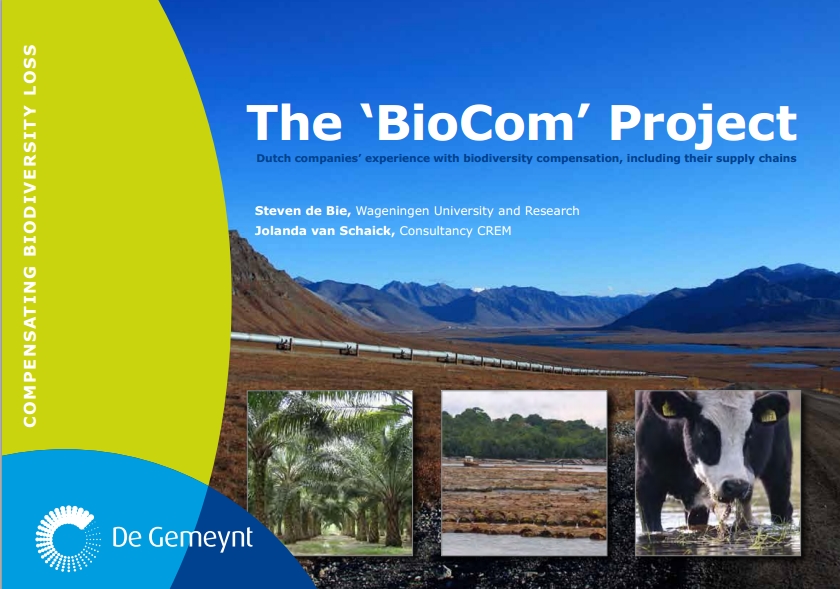 Our worldwide economic activities have repercussions on biodiversity. Plant and animal species are disappearing at an ever increasing rate and the natural resources of our world are becoming scarcer. It is high time to do something about it. The project ‘Biodiversity Compensation: Towards concrete plans and guidance for businesses’ provides inspiration, knowledge and experience. The results are published in ‘The BioCom Project’.
Our worldwide economic activities have repercussions on biodiversity. Plant and animal species are disappearing at an ever increasing rate and the natural resources of our world are becoming scarcer. It is high time to do something about it. The project ‘Biodiversity Compensation: Towards concrete plans and guidance for businesses’ provides inspiration, knowledge and experience. The results are published in ‘The BioCom Project’.
This report describes among others three compensation plans that are tested in practice. Additionally, a practically applicable step-by-step plan was drawn up for progressive companies that wish to take action in the field of biodiversity compensation. Continue reading
Pictures say more than words — and some of these are really mean. Does biodiverity offsetting work this way? Critics would say: yes, biodiversity offsets are bad. Anyway, the drawings point to some of the core problems of biodiversity offsets — are we able to live with them or do we need to stop biodiversity offsetting?
About the Biodiversity Offsets Newsweek
If you are interested in environmental compensation and biodiversity offsets, there are certainly good news: there is now a whole bunch of information from different sources,  locations and viewpoints publicly available (something which wasn’t this easy only a couple of years ago). Now, as has been pointed out (see here) the Biodiversity Offsets Blog aims to compile and somewhat structure this information. But there is not only a wealth of sources already out there on the internet, but also new sources are continuously being added. I am following and collecting the news via Scoop.it and cover the most trending ones in posts on the Biodiversity Offsets Blog.
locations and viewpoints publicly available (something which wasn’t this easy only a couple of years ago). Now, as has been pointed out (see here) the Biodiversity Offsets Blog aims to compile and somewhat structure this information. But there is not only a wealth of sources already out there on the internet, but also new sources are continuously being added. I am following and collecting the news via Scoop.it and cover the most trending ones in posts on the Biodiversity Offsets Blog.
Nevertheless, not all news can be covered (at least not yet) and therefore the “Biodiversity Offsets Newsweek” will list up the headlines of the past week, together with the links and PDFs of the articles or news (the latter to prevent to loose information — as we know, that unfortunately every now and then things are being removed from the internet).
This week: September 15–21, 2014
This week (September 15–21, 2014) was relatively calm compared to the hustle and bustle of the past week. However, I have found some interesting pieces of information. The first is an article that draws a critical analogy between biodiversity offsets and Jenga towers. And there are some more news from the controversy on the intorduction of biodiversity offsets in the UK, namely the “nightingales of Lodge Hill” (where a housing development is planned) and Smithy Wood (in which a motorway service station shall be built). Further on, the teaser “Biodiversity offsetting cannot compensate for ‘old growth’ habitat loss” by the European Commission points to a study by Curran, M., Hellweg, S. and Beck, J. (Is there any empirical support for biodiversity offset policy? Ecological Applications. 2014, 24(4): 617–632). And don’t miss this week’s cartoon by High Moon.
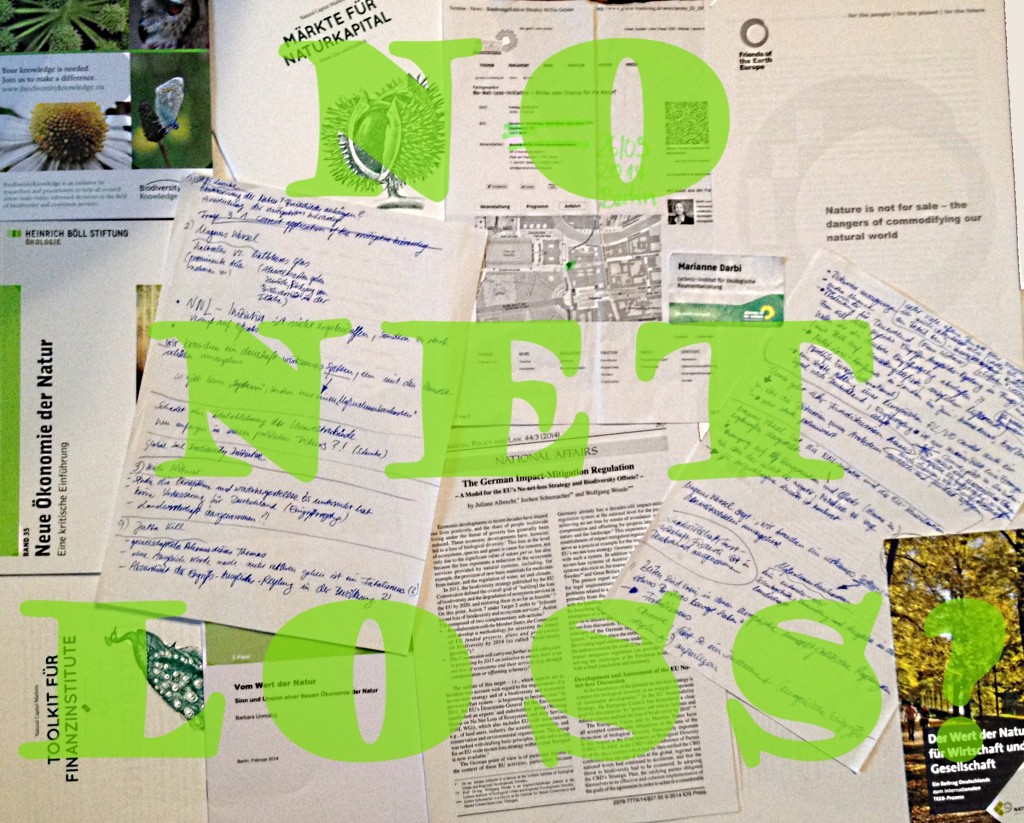 Last Friday I have been to a political session organized by the German Green party (Die Grünen) of the Federal Parliament (Bundestag) in Berlin. Steffi Lemke, parliamentary executive and speaker for nature conservation policies for the Green party, invited experts and the interested public to discuss the current discussion and development of the EU towards a No Net Loss Initiative (see my previous post here).
Last Friday I have been to a political session organized by the German Green party (Die Grünen) of the Federal Parliament (Bundestag) in Berlin. Steffi Lemke, parliamentary executive and speaker for nature conservation policies for the Green party, invited experts and the interested public to discuss the current discussion and development of the EU towards a No Net Loss Initiative (see my previous post here).
It has been quite a while since the last newsletter of the Business and Biodiversity Offset Programme. So, I was both happy and surprised when the latest newsletter came in last week. It is full of information from the biodiversity offsets field that have emerged over the past months.
A Session of the Sustainable Development and Environmental Economics Seminar is held in Paris on Tuesday, September 30, 2014. It is entitled “Biodiversity Offsetting and sustainable development: a right to destroy, a fool’s bargain or a tool for reconciliation?” Continue reading
The German Federal Association of Compensation Agencies (Bundesverband der Flächenagenturen BFAD) is holding its annual conference, this time in Stuttgart. The two 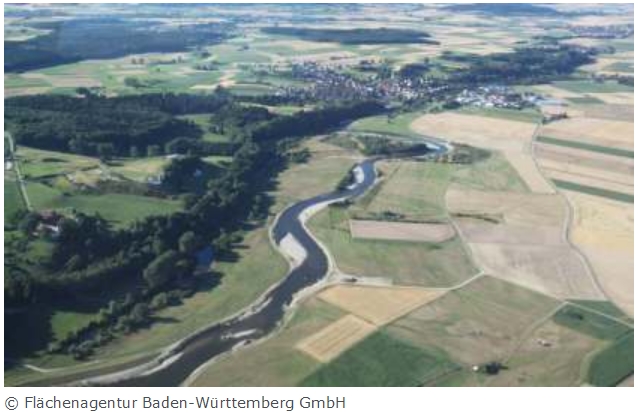 day event will focus on compensation pools and eco-accounts and include both presentations (and discussion) as well as an on site excursion to different compensation sites in the vicinity of Stuttgart. This year the high land use pressure and problems for the availability of compensation sites will be discussed.
day event will focus on compensation pools and eco-accounts and include both presentations (and discussion) as well as an on site excursion to different compensation sites in the vicinity of Stuttgart. This year the high land use pressure and problems for the availability of compensation sites will be discussed.
Read more online or see the program: Program of the Annual Conference of the German Federal Association of Compensation Agencies
